Greetings friends - It’s been a while since my last post, I hope your year is off to a good start 🥂
A quick thank you to everyone who subscribed to Serendipity Lab in 2024. Expressing my thoughts and observations online has been one of the most fulfilling and rewarding tasks I’ve ever taken on. I appreciate every like, comment, and share from the bottom of my heart.
Sure it’s an ego boost to see the numbers go up, but what I value the most are the connections.
I’ve met a bunch of new friends through writing. Some of us have even met IRL. I always enjoy that first encounter — from online to offline. After the initial shock of seeing how tall/short the other person is, it feels like we already know each other. We’ve developed a sort of parasocial relationship through our writing and communication.
This year I’m prioritizing human connection. Part of my vision for Serendipity Lab is to host in-person gatherings so we can actually hang out with each other. Meeting up with strangers from the internet and cultivating weak ties is one of the best ways to inject a dose of serendipity into your life.
So to kick things off, I’m hosting a Substackers Meet-Up in Barcelona on February 12th, hope to see you there!
Now on to today’s essay…
Last year I wrote about how my family takes an unconventional approach to the holidays. Instead of buying a Christmas tree and exchanging presents, we travel to a foreign country and spend quality time together:
This trip marks our 27th year of this tradition and I’m certain this is the best gift you can give your children. Canceled flights, lost bags, catching diseases in third world countries.
The list of things that can go wrong is endless. But by overcoming these obstacles, our bond has grown stronger.
We started this tradition back when we all lived together under one roof. Now that our tiny family is spread across two continents and three countries, it makes these get-togethers even more special.
This year we visited the Kingdom of Saudi Arabia. If I were to sum up the trip in one phrase, it would be: culture shock
It's possible to experience culture shock anywhere, but the degree to which you experience it will depend on the “cultural distance” between your home and the destination. As a white male, traveling around America or Europe doesn’t shock me as much as visiting a place like Saudi Arabia does.
It could be due to my preconceived notions. After all, mass media tends to portray Muslims as terrorists who blow stuff up:
A post-9/11 review of the United States film industry evinces the entrenchment of such stereotypes, as Arabs and Muslims are almost exclusively portrayed as terrorists or other negative characters rather than as everyday people with family and friends.
…
The news repeatedly links “Muslim” with “terrorism.” When terror attacks are perpetrated by Muslims, they receive significantly more media attention. One study found that Muslim attacks receive on average 357% more media coverage.
This is complete bias. I can’t speak for the entire country, but I felt safe throughout our entire visit, whereas even in Barcelona I have to watch out for pick-pockets.
The crime rate in Saudi is much lower than many other countries around the world. People think it’s because of Sharia Law or because they will cut off your hand off if you steal something, that’s a common misconception.
The crime rate is low because of the social lives they live.
In Saudi, the family is judged by the individual, meaning that anything you do will effect the family reputation. This is especially important when it comes time to marry. I asked one of our tour guides how he met his wife, he told me it was arranged by his mom, but the details of the process were different from the way I conceived it.
It begins with the man announcing his intent to marry, he tells close female relatives like his mother and sisters to search for a suitable bride. He also tells them his preferences, whether physical attributes, personality traits, or shared hobbies. These relatives then leverage their social networks to identify potential matches. It’s like an analog version of Tinder.
Our norms are shaped by our own societal context, so comparing this to the way we date in the Western world blew my mind.
I was fully aware that some countries still participate in these types of traditional practices, but meeting someone in-person who has gone through it and being able to ask him questions and explain the process to me was fascinating.
Saudi itself is experiencing major cultural shifts, it’s not until recently that women were given basic rights such as riding a bicycle, driving a car, or the right to vote. Yet none of the Saudi women I spoke with expressed feelings of oppression or wanting to escape. This is another case where Western media portrays bias.
The majority of people we met were so welcoming and friendly:
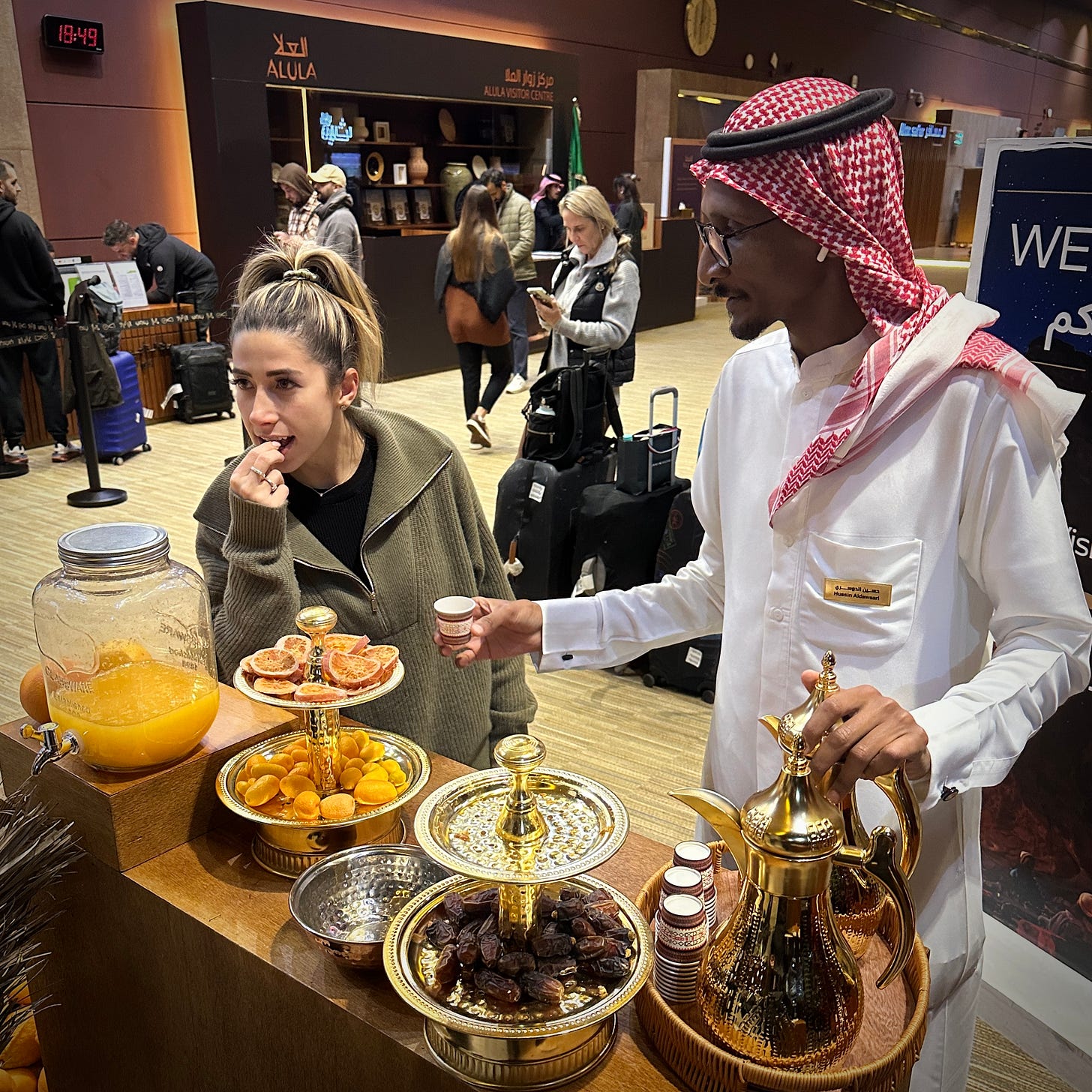
In Jeddah, we found this hole in the wall hummus place with only three tables and a few items on the menu. Everything was in Arabic but another customer who spoke English helped us order:
It was so fresh and tasty, we returned the following night for a second round.
The guy working the cash register remembered us and insisted on a selfie. If you ever plan to visit Jeddah and want a local experience, save this spot on your map:
I didn’t see big groups of foreigners like I do in many other places these days. We mostly encountered people from other Middle Eastern countries as well as Saudi locals sightseeing within their own country.
We were asked repeatedly why we chose to visit Saudi Arabia. There was this sense of curiosity, people often assumed we were there for work or business.
It’s one of the aspects I enjoyed most. It still felt authentic, somewhat undiscovered.
There’s no alcohol in Saudi so instead of bars and clubs, the streets are lined with cafes and people drink coffee well into the late evening hours.
For New Years Eve, there was ZERO public celebration. In Saudi, December 31st is just another day. Islamic countries follow the Hijri calendar, not the Gregorian calendar used in most parts of the world.
Still, many cities in the Middle East have some sort of New Year celebration. Dubai for example has one of the biggest firework shows in the world. Quatar also hosts a massive pyrotechnic & light show in Lusail.
Saudi has not caught on to the trend. This IG post from Time Out Riyadh makes it seem as if there’s some sort of celebrations happening in the capital city, but a quick scroll through the comments shows that’s clearly not the case.
The traditional outfit still reigns supreme over western style clothing. Even after being immersed in it for weeks, it was still bizarre seeing so many women covered head to toe with only a small slit revealing their eyes.
Going places where you’re the minority is how you reach peak levels of culture shock.
When you visit these places, you expose yourself to real-world everyday life, not just the limited sensationalized world that the media portrays.
I like the way Rick Steves explains it in his brilliant NY Times interview:
The most frightened people are the people who have never traveled, whose worldview is shaped by commercial news media. And the people that are not afraid are the people who have been out there and met the enemy. My most powerful travel experiences have been going places where I’m not supposed to go: Cuba, Palestine, Iran. The friendliest people, the most curious people, the people that need to meet me and I need to meet them. When they meet me, it’s tougher for their propaganda to demonize me, and when I meet them, it’s harder for my country’s propaganda to dehumanize them. It’s a powerful thing.
Culture shock is constructive. It broadens your perspective and debunks biases.
When someone asks me what my favorite place is, I never reply with any of the usual suspects like Paris, Rome, or London. Those cities are great, but I always suggest people visit places off the beaten path, where the cultural norms are on the other end of the spectrum.
Those places will change you. The memory I always refer back to is our visit to India when I was teenager. Seeing the day-to-day life and the poverty people live in made me so grateful to grow up in a place like the United States.
That gratitude is something I still carry with me to this day. A point that is best summed up by the famous Marcel Proust quote:
“The real voyage of discovery consists not in seeking new landscapes, but in having new eyes.”
So when planning your next vacation, consider visiting a place like Saudi or India or Bangladesh. A place where the cultural norms are completely different than your home country. It will expose you to a different way of life and perhaps even debunk some of those biases shaped by commercial media.
Until next time my friends,
<3 B


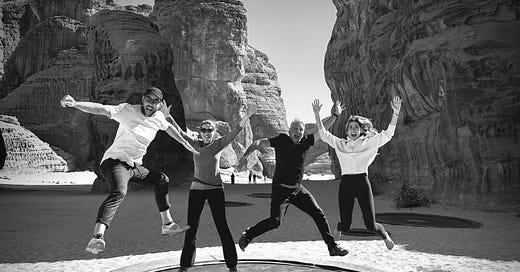



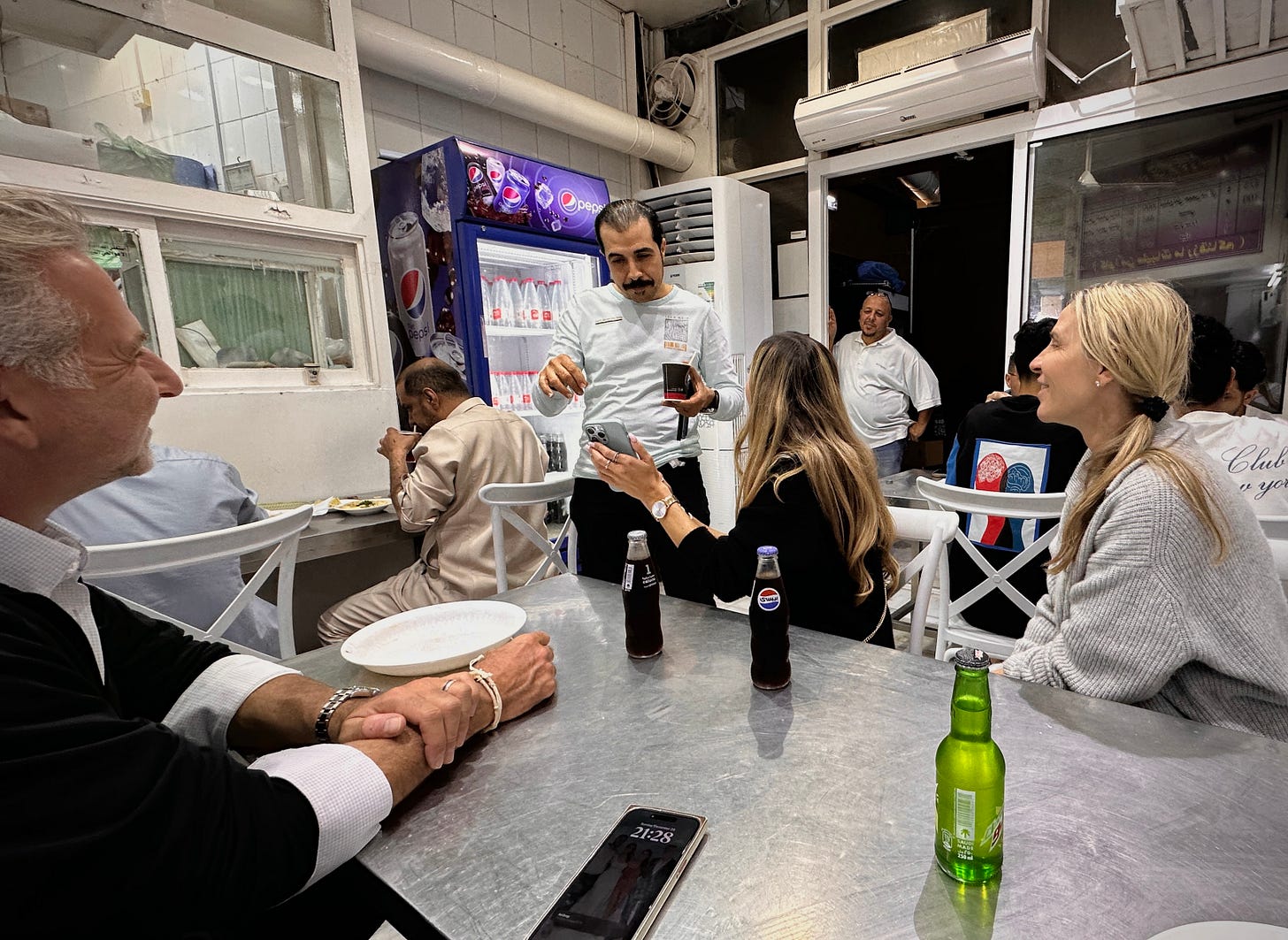
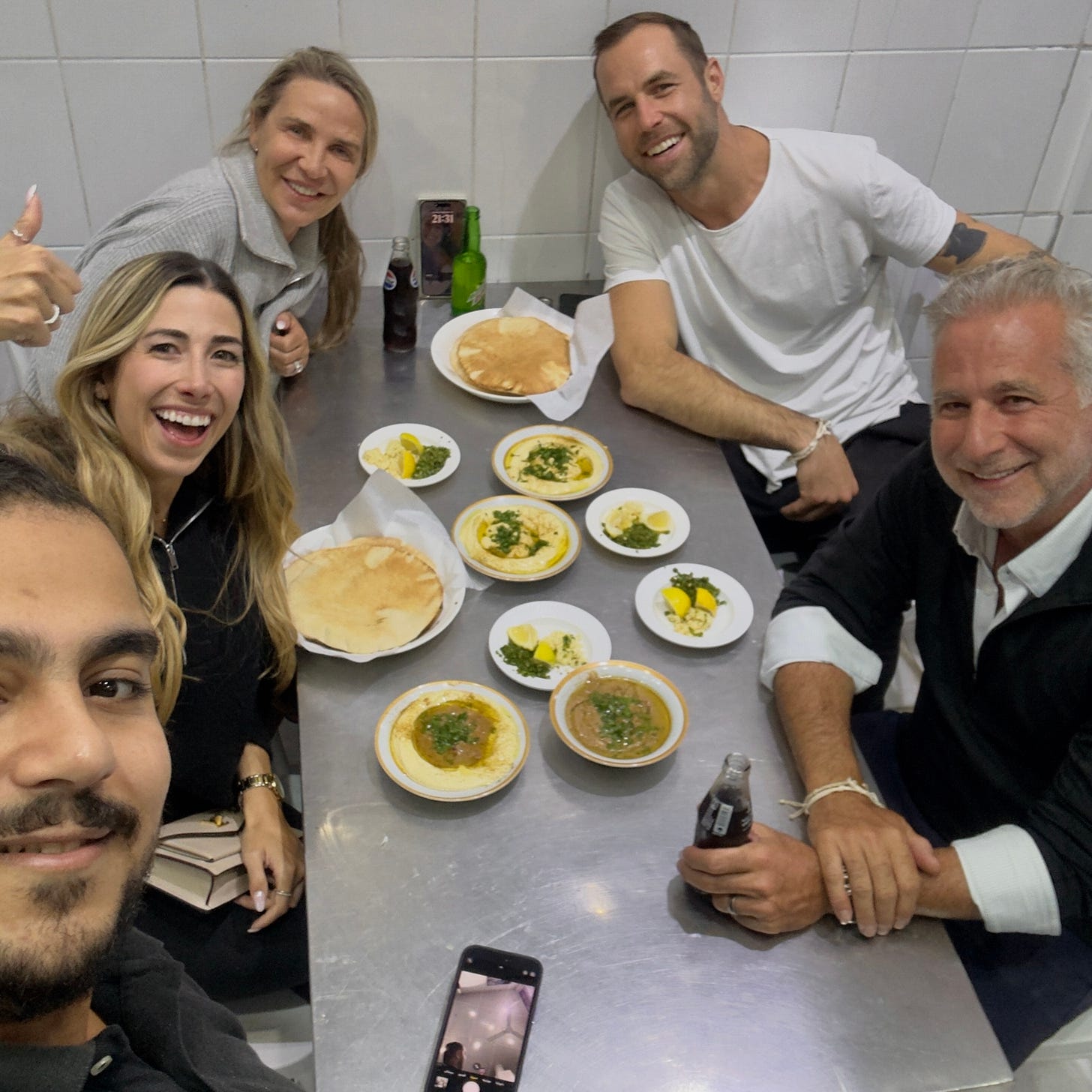
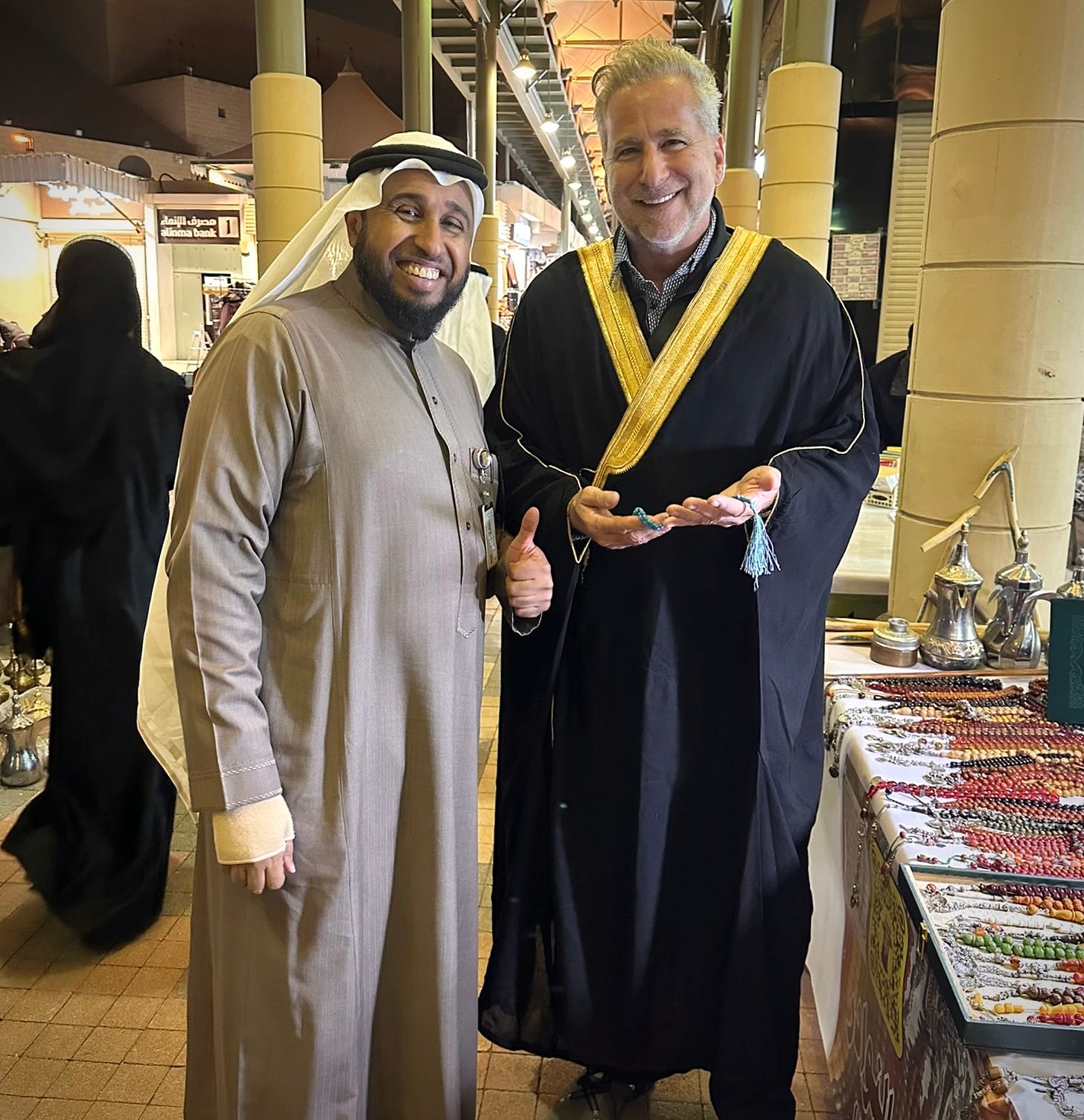
Thank you for sharing this with us. Such a good reminder to step out of my travel comfort zone. I'm curious if the women in your group saw things differently from your perspective?
What a wonderful family tradition, Brian. And what a remarkable experience you and your family had in Saudi Arabia.